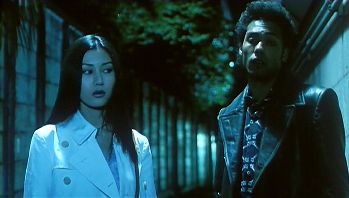![[Deep Focus]](../../flicker/longo.gif)

Dark city
![[Deep Focus]](../../flicker/longo.gif)
|
|
| City of Lost Souls
|
|

|
B+ |
Dark city |
|
|
Movie Credits: Directed by Takashi Miike Written by Ichiro Ryu from the novel by Seishu Hase Cinematography by Naosuke Imaizumi Starring Teah and Michelle Reis Japan, 2000 Aspect ratio: 1.85:1 Screened on DVD Miike @Deep Focus: |
Japanese provoc-auteur Takashi Miike may be the most interesting-and certainly the most mischievous-genre stylist at work today. No sooner do you feel you've found a kindred spirit here than the director commits some act of profound cruelty. It's difficult just to keep up, and more so to get a read on his state of mind. But underneath the kinetic flash and unabashed affection for incredible, shocking violence, there's intelligence, humor and an elusive but real moral epicenter. City of Lost Souls isn't primo Miike-for that you'll need to check out his harrowing Audition, which stands head and shoulders above the rest of his work that I've seen. But it is quite a ride, and it's one of the few Miike films available in the U.S.; I imported my copy from Hong Kong, but I was surprised to see it on the shelf at my local Borders store just the other day. City of Lost Souls is a well-dressed crime drama with an undercurrent of profound sadness. It believes in love, but it mourns the death of a Japan that once was. The protagonist is Mario, a Brazilian bad-ass who saves his Chinese girlfriend Kei (Michelle Reis) from deportation in a delirious early scene depicting a helicopter rescue (it was apparently shot just outside Los Angeles, doubling for the desert of Southeast Asia). Back in Japan, Mario grabs his girl by the hand and leaps out of the helicopter, several hundred feet up. The two drop like stones, but when they hit solid earth, the impact generates an explosion that knocks bystanders to the ground, and the two lovers step out of the dust and debris like cyborgs in a Terminator movie. I was watching at home, and still I hooted and hollered. It's a perfect, nigh-mythic introduction to the highly amplified, multiethnic world of Miike's films. (Wait 'til you get a load of the Matrix-inspired cockfight.) Our hero's girlfriend is also the favorite of some Chinese gangsters-my wife promptly dubbed the leader "Mr. Clean" in reference to his sleek personal style. The tense, hateful relationship between the Chinese and Japanese gangs, who tolerate each other for the sake of their drug dealings, gives the film a lot of its juice. Think about the famous exchange between Christopher Walken and Dennis Hopper in True Romance to get a sense of the racial resentment Miike explores here. As far as the director is concerned, both Chinese and Japanese notions about death with honor are quaintly outmoded in a corrupt society that tends to value dollars above human life. There's no honor among thieves here. He makes the points bluntly, and with no shortage of blood. It's easy to accuse Miike of indulging a glib streak of nihilism, but he clearly believes in the life-changing power of love. After taking out the bad guy, it's "love" that our hero spells out on the pavement in his own blood-and it's love that leads to his ultimate fate in the film's final minutes. That's what makes these characters interesting-they're willing to defy expectations, and their better judgment, based on emotional attachments and betrayals. I have yet to see much indication that Miike shares the qualities-the preternatural knack for recognizing and representing the sublime contrasts between life and death-that make his countryman Takeshi Kitano such a compelling teller of superficially similar tales. Then again, I've only seen three Miike films at this writing (the guy cranks out that many in a single typical year) and the best may well be yet to come. What's for sure is that he's smart and darkly funny and able to slip among different storytelling modes-from the Ozu-like opening reels of Audition to the same film's Argento-only-wishes finale-without breaking a sweat or betraying his ultimate intentions. As hackneyed as the comparison is, he keeps putting me in mind of Hitchcock-his films are often playful, but they can just as easily cut you off at the knees. |
 http://www.deep-focus.com/dfweblog/
bryant@deep-focus.com
http://www.deep-focus.com/dfweblog/
bryant@deep-focus.com